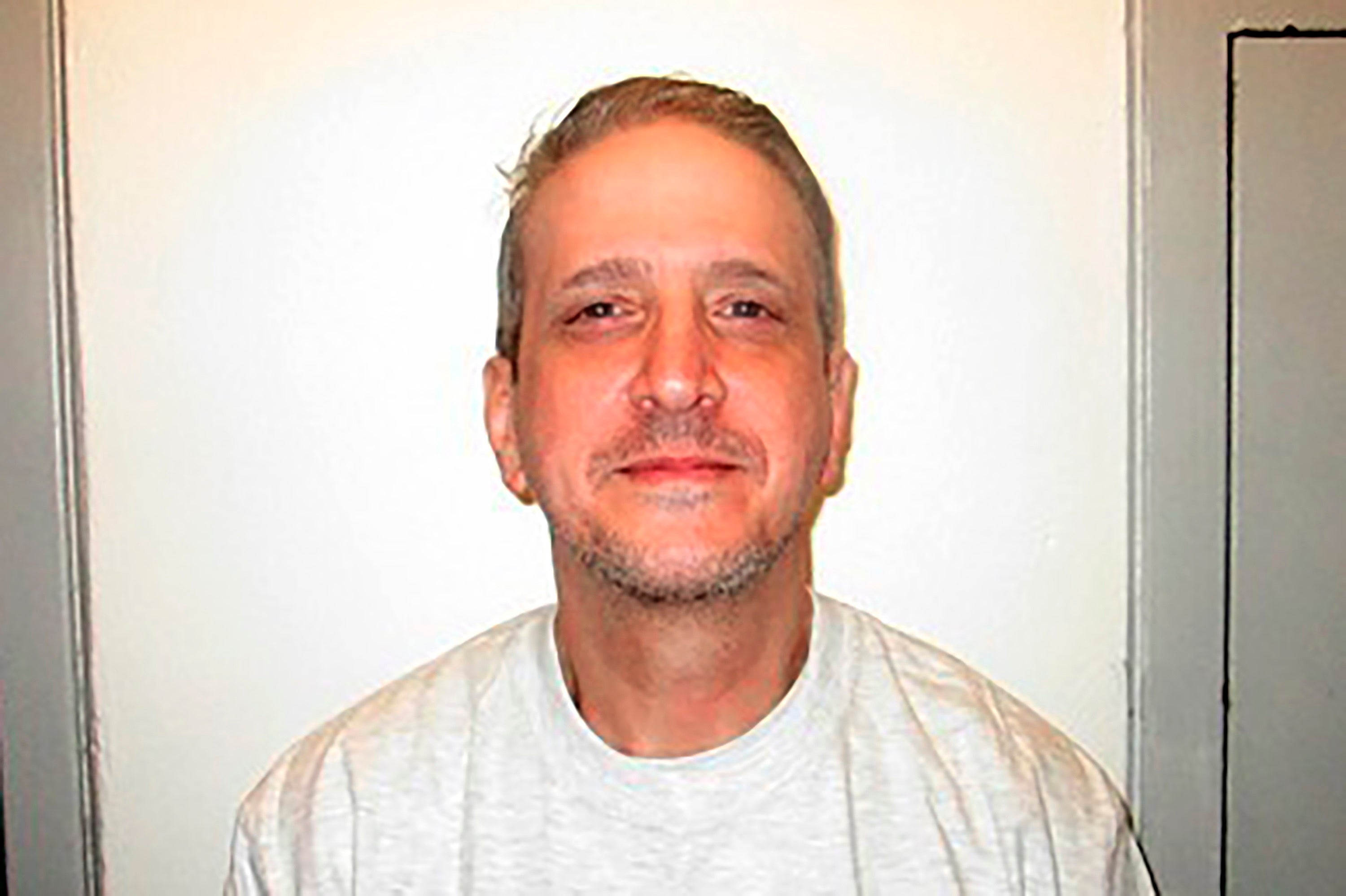Why Oklahoma has delayed Richard Glossip’s execution seven times
State has struggled with botched executions and mistaken drugs in recent years, writes Josh Marcus


Oklahoma has pushed back the clemency hearings of two death row inmates, John Hanson and Richard Glossip, a high-profile prisoner who has spent years battling his conviction and claiming innocence.
Both men had been scheduled for last-chance clemency hearings on 9 November before the delay, but both cases have been marred by issues.
Hanson is currently serving a separate sentence in federal prison in Louisiana for a string of armed robberies, and federal officials have refused requests from Oklahoma prosecutors to move him onto the state’s death row, to serve a death sentence for a 1999 double murder.
In September, Acting Complex Warden S.R. Grant told Oklahoma officials that federal law “authorizes the Bureau of Prisons (BOP) to transfer a prisoner who is wanted by a State authority to that State authority’s custody if it is appropriate, suitable, and in the public’s best interest,” and that he had “denied the request for transfer, as it is not in the public’s best interest.”

The US government declared a moratorium on federal executions last year.
Hanson’s attorneys argue he has mental illness, brain damage, and autism, and that his co-conspirator in the Oklahoma case saw his life sentence overturned.
The delay comes as Glossip saw his execution date pushed back seven separate times amid his continued claims of innocence and issues with the state’s death penalty protocols, most recently at the beginning of this month.
Glossip, convicted of the 1997 murder of his boss at an Oklahoma City motel, was most recently scheduled to be executed on 8 December, though that has since been pushed back to 16 February, 2023, the seventh time his death date has been postponed.
Oklahoma governor Kevin Stitt paused the executions to allow for Glossip’s latest claims of new evidence to be considered by a state appeals court.
Glossip and his attorneys petitioned the Oklahoma Court of Criminal Appeals (CCA) for a hearing on new evidence that the state fed a key witness testimony, stopped the witness from later recanting, withheld exculpatory evidence from the defence, relied on a witness proven to be unreliable, and went against department policy in capital cases and destroyed valuable financial records that could’ve cleared Glossip’s name.
However, the CCA held this month that, “None of his claims convince this Court that the alleged errors have resulted in a miscarriage of justice or constitute a substantial violation of a constitutional or statutory right.”
“The only thing we asked for in our two petitions was a fair hearing on our newly discovered evidence that the jury never heard,” Glossip’s attorney Don Knight said after the final ruling of the CCA last week. “We are extremely disappointed that instead of giving us this opportunity, the Court improperly assumed the role of factfinder, and closed off our opportunity to begin to right this tragic wrong. But our fight to free this innocent man will never end.”
Though the courts so far have been unpersuaded of the new claims, a growing group of Republican leaders and justice activists are rallying behind the Glossip innocence movement, as The Independent has reported
They say the case was tainted against the beginning, and Glossip’s conviction is based on smoke and mirrors.
On 7 January, 1997, 19-year-old maintenance man Justin Sneed beat his boss, 54-year-old motel owner Barry Van Treese, to death with a baseball bat. Oklahoma police arrested the teenager, who had a history of drug addiction, violence, and past criminal offences.
In a gruelling interrogation, police officers, including a detective against whom Glossip had previously filed a complaint in an unrelated matter, suggested to Sneed that Glossip was culpable six times in the first 20 minutes.
One detective went so far as to tell the 19-year-old, “The first one that comes forward is the one that’s gonna be helping himself.”
Prosecutors eventually settled on a theory was Glossip, who had no significant criminal history, and who regularly handled thousands of dollars in cash on behalf of the owner Van Treese, decided to rob and then murder his employer, splitting the proceeds with Sneed.
“The thing that didn’t make any sense right off the bat is Richard Glossip had all the money, he always had all the money. It was a cash kind of business. He would hold money until Van Treese came to pick it up,” Don Knight, Glossip’s attorney, told The Independent earlier this year. “That never made any sense to me. You could have twice as much and you didn’t have to kill anybody to get it. You could just walk off. That was absolutely insane to me.”
No physical or witness evidence linked Glossip to the killing, and the state’s case against the 33-year-old rested, an Oklahoma appeals court later put it, “entirely” on the word of Sneed.
This summer, an outside investigation requested by state lawmakers found heaps of new information about the case, raising serious questions about whether Oklahoma is about to execute an innocent man.
Among the most shocking findings were that Sneed appeared to be considering recanting his testimony on multiple occasions.
A 2001 letter, before Glossip’s second trial, captured Sneed describing how the process might give him the chance to “ponder the right thing to do.” In 2003, he wrote to his lawyer that, “Parts of me are curious that if I chose to do this again, do I have the choice of re-canting my testimony at any time during my life, or anything like that.” More recently, investigators found a 2007 message from Sneed, where he admitted, “There are a lot of things right now that are eating at me… Some things I need to clean up.”
“Our conclusion is that no reasonable juror, hearing the complete record, and the uncovered facts ... would have convicted Richard Glossip of capital murder,” attorney Stan Perry of firm Reed Smith said in June.
Subsequent investigations have also found that the Oklahoma City Police Department, at the direction of the Oklahoma County District Attorney’s Office, destroyed boxes of evidence before a retrial in 2004, including financial records, in seeming contravention of a longstanding agreement between the two offices not to destroy evidence in a capital case.
“This loss or destruction of evidence appears to be so critical to the defense as to cast serious doubt as to the fundamental fairness of the criminal trial against Glossip,” the Reed Smith report stated.
(The DA’s office has said it only destroyed evidence unnecessary to the case.)
Surveillance video from a gas station near the site of the murder has also disappeared. Van Treese’s car, which had $23,100 in its trunk, was released to his family. Jurors never learned about the police’s aggressive interrogation tactics.
Nor did they know Cliff Everhart, one of the state’s witnesses, was under investigation by Oklahoma state police, including for making false statements to law enforcement.
Sneed offered conflicting versions of events each time he was interviewed.
A woman who regularly stayed at the motel where the murder took place, told The Intercept it was widely thought that Sneed had been stealing from the hotel to feed his methamphetamine habit.
“He was slick. I mean, you turn your back on him, in a second he’ll have his hand in your purse,” she told the outlet. “He disgusted me,” she added.
A week before the 1997 murder, Ms Garcia said she and her friends fled the motel because Sneed grabbed one of her friends by the throat and pinned her to a motel room wall, only stopping when Ms Garcia pulled out a knife and threatened him.
The Independent and the nonprofit Responsible Business Initiative for Justice (RBIJ) have launched a joint campaign calling for an end to the death penalty in the US. The RBIJ has attracted more than 150 well-known signatories to their Business Leaders Declaration Against the Death Penalty - with The Independent as the latest on the list. We join high-profile executives like Ariana Huffington, Facebook’s Sheryl Sandberg, and Virgin Group founder Sir Richard Branson as part of this initiative and are making a pledge to highlight the injustices of the death penalty in our coverage.



